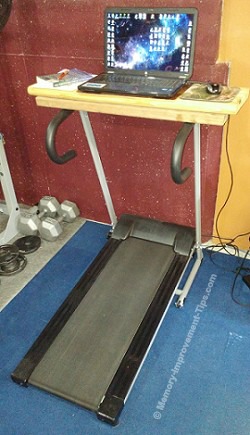- Home
- Better Memory
- Free Memory Tips
- February 2015 Issue
Free Memory Tips, February 2015 Issue
Below is the February 2015 issue of Free Memory Tips. To learn more about this free email newsletter, or to start receiving it, please visit the Subscription Page. I send out the newsletter about once a month. You can unsubscribe at any time.

Welcome to the FEBRUARY 2015 issue of my free Memory Tips email newsletter. Below are powerful strategies for improving your memory. Ready to boost your brain power?
Below are powerful strategies for improving your memory. Plus I've included links to free online brain games that can strengthen your thinking skills.
In this issue:
The Treadmill Desk: Live Longer, Get Smarter
Dementia Risk from Long-Term Use of Benadryl, Tylenol PM, Dramamine
Powerful Secrets for Boosting Your Vocabulary
FREE Brain Games: Improve CONCENTRATION Skills
If you like this newsletter, "pay it forward" by sending this to a friend. If someone did forward this to you, and if you like what you read, please subscribe by visiting the Memory Tips subscription page.
My goal is to help you learn faster and remember more. That's why I created Memory-Improvement-Tips.com and this email newsletter.
The secret to a more powerful brain is two-fold: 1) improve your brain health, and 2) learn memory techniques. This can lead to more success and fulfillment in life!
The Treadmill Desk: Live Longer, Get Smarter

Do you spend a lot of time sitting at the computer, either at your job or at home?
Shockingly, researchers have found that prolonged sitting increases a person's chances of dying from all causes.
Well, what if I told you there is piece of equipment you can use while you are on the computer that may:
Lower your risk of dying;
Improve your memory and attention;
Get you in better physical shape.
You would sit up and take notice, right? Well, forget the sitting part. Instead, walk at a slow pace while you work.
That machine does exist. It's called a treadmill desk, and I use one myself.
A treadmill desk is an exercise treadmill with a desk on top where you can do work. Especially computer work.
In 2012, a large study published in the Archives of Internal Medicine found sitting hours a day increases a person's risk of dying from all causes whether or not they exercise at other times.
From the study:
Prolonged sitting is a risk factor for all-cause mortality, independent of physical activity.
Sitting down for long periods is not good for your health! As a knowledge worker for many years, that's really worrisome to me.
Working at a treadmill desk reduces this risk significantly, because, of course, you are no longer sitting. We're talking about slow walking, by the way (less than 2 miles/hour), not power walking.
But this is a memory improvement newsletter. Why do I bring up treadmill desks?
Because a new study in the journal Computers in Human Behavior found that working on a treadmill desk also boosts memory and attention.
A treadmill desk is really an out-of-the box idea. Some people will hate the concept. But, as I found out in my own case, it may work for your situation.
Walking and using a computer at the same time does take some getting used to, but it can be done. Remember the benefits:
Boosts memory and attention
An easy, low-impact workout
Could increase your lifespan
I actually built my treadmill desk, months ago, and I really like using it.
In the beginning, I was primarily interested in the physical health benefits and increased longevity. But now we know it's also a brain builder! Wow.
I assembled my treadmill desk for literally no money. I used scrap lumber from my shed and an old treadmill I already had.
But plenty of folks have built their own treadmill desk for just a few bucks.
I do computer work on my treadmill desk several days a week. I am walking on it right now at 1.5 miles/hour as I type this.
I position my laptop computer atop a board that spans across the treadmill and rests on the side handles. If you have a desktop computer, you can sit the monitor, keyboard, and mouse on your treadmill desk, leaving the cpu tower on the floor or a table.
There is plenty of room on my treadmill desk for mousepad, books, and papers.
Studies have found 1.4 miles/hr (2.25 km/hr) is the ideal, least-intrusive treadmill speed for doing computer work. This is quite a slow pace. You can easily type and do computer work and not get winded.
Now that I'm used to it, I'm able to work continuously for an hour or two without a break. That's even when I bump up the speed up 1.8 miles/hour, which I often do.
A treadmill desk my seem like a crazy idea. And if you are physically active and don't spend a lot of time on your computer, perhaps it doesn't make sense for you to use one.
But if you are a knowledge worker or someone who sits at the computer a lot, you might want to think about investing in a treadmill desk for your home and/or inquiring with your boss about getting a treadmill desk for work.
If you don't think your boss will go for it, this quote from a recent study may help bring him or her around:
Improvements in work performance should be convincing for organizations that may be inclined to subsidize the use of treadmill desks.
As researchers bleakly point out, "Sitting is the new smoking." Sitting for hours is really that bad for your health.
And now we know that using a treadmill desk can not only reverse that risk, it can actually boost memory and attention.
Keep an open mind and consider whether a treadmill desk might work for your situation. You might just end up healthier, longer-lived, and smarter for adopting this unusual walking work stance.
References:
1. Treadmill Desk Makes Your Smarter, Says Study
2. Sitting time and all-cause mortality risk in 222,497 Australian adults (Archives of Internal Medicine)
Dementia Risk from Long-Term Use of Benadryl, Tylenol PM, Dramamine

Chronic use of anticholinergic over-the-counter and prescription medicines has been found to increase the risk of dementia, including Alzheimer's disease.
Be very careful about taking anticholinergic medicines like Benadryl, Elavil, Tylenol PM, Dramamine, or Soma in high doses or for long periods of time.
Researchers discovered that as little as 60 days of continuous use of some common medications can result in measurable cognitive impairment.
This really caught my attention. I've have allergies, so I take Benadryl, Chlor-Trimeton, and other anticholinergic over-the-counter allergy medicines occasionally.
Allergy meds are just one drug category of concern, though. Others include sleep aids, bladder medications, and antidepressants.
As one study's authors noted:
Millions of older adults are taking sleeping pills or prescription drugs year after year that may be impacting their organizational abilities and memory.
Anticholinergics suppress the activity of acetylcholine, a neurotransmitter the brain uses to send signals between neurons. Dampening acetylcholine through medications may impair thinking and memory - maybe permanently.
Moderate-to-high anticholinergic effects are associated with both over-the-counter and prescription medications. Some of these include:
Anti-Arrythmics - e.g., Norpace, Pronestyl, Quinaglute
Anti-Emetics - e.g., Dramamine, Antivert, Tigan
Antihistamines - e.g., Chlor-Trimeton, Tavist, Tylenol PM, Benadryl
Anti-Parkinsons - e.g., Cogentin, Akineton
Anti-Psychotics - e.g., Thorazine, Zyprexa, Seroquel
Anti-Spasmotics - e.g., Sal-Tropine, Anaspaz, Scopolamine
Skeletal Muscle Relaxants - e.g., Soma, Robaxin
Tricyclic Anti-Depressants - e.g., Elavil, Norpramin
For a more complete listing, see VirginiaGeriatrics.org.
Do you or a loved one take any of these medications, especially in high doses or continuously for months or years? If so, it might be wise to discuss with a physician the possibility of making adjustments to use the absolute lowest effective dose.
As a recent study concluded:
Higher cumulative anticholinergic use is associated with an increased risk for dementia. Efforts to increase awareness among health care professionals and older adults about this potential medication-related risk are important to minimize anticholinergic use over time.
Note: Always consult your doctor before making any changes to your medications.
References:
1. Higher dementia risk linked to more use of common drugs
2. Cumulative Use of Strong Anticholinergics and Incident Dementia (Journal of the American Medical Association)
3. Using anticholinergics for as few as 60 days causes memory problems in older adults
4. VirginiaGeriatrics.org. "Commonly Used Drugs with Moderate to High Anticholinergic Properties."
Powerful Secrets for Boosting Your Vocabulary
To strengthen your memory, expand your vocabulary.

We tend to forget what we cannot understand. Conversely, what we understand well sticks easily in memory. This is especially true of what we read and hear every day.
Therefore, one powerful way to strengthen your memory is to continually learn new words.
While reading, you may unconsciously tend to skim over words you don't understand. It may seem too much trouble to look up the definition.
Or when listening, there might not seem time to research the meaning.
But making new words your own pays dividends. When you learn a new word, you've invested in your brain power, including your ability to learn and remember future information.
As a wise man once said:
The mind once expanded by an idea never returns to its original size."
- Oliver Wendell Holmes
But that only works if you understand the idea!
Here are a few tips on how to make learning new words a brain boosting habit.
Tip 1: Keep a Dictionary Handy
I have several dictionaries scattered around my home. One giant Webster's that I've had for many years, plus a few mid-size and pocket editions. I keep a dictionary close at hand while reading.
If you don't have a dictionary, it's easy to find inexpensive used copies. Check thrift stores like Goodwill and used book stores for preowned dictionaries. You'll likely find an assortment at rock bottom prices.
If you have a smart phone with internet access, or a computer with access to the web is nearby, looking up definitions is really a snap. Simply type the word "define" in a Google search box followed by the word itself.
For example, enter "define hyperbole" in a Google search to get the definition instantly.
In addition to the meaning, Google displays a pronunciation guide, list of synonyms, and even an audio example of the word so you can hear it.
For situations where you don't have access to a computer or dictionary, at least jot down the word and look up the meaning later.
Tip 2: Use the Keyword Method to Quickly Memorize the Definition
Now that you've got the definition, you need to learn the word. To keep memorization time to a minimum, use the Keyword memory technique.
Suppose you encounter the word "transient" and don't know the meaning. After looking up the definition, you see it means "short-lived" or "ephemeral."

The secret to rapidly learning this word is to associate the sound of the word with the meaning. A visual association is especially powerful.
Using the Keyword memory trick, say transient out loud and listen to the sound of the syllables.
Then think of a phrase made of concrete nouns and/or action verbs that sounds similar to these syllables.
For example, to me transient sounds like the phrase "train sees ant".
Well, I can visualize that. So I imagine a fast-moving train barreling down on an ant sitting on the train tracks. (See image above.)
Now think of a way to link the definition to the word itself. In this case it's quite easy. The train won't stop, so this ant is about to be "short lived"!
Thinking of a bizarre associative image seems silly, but this method works well for memorization, because the mind remembers images and the unusual.
Transient sounds like "train sees ant". The ant is about to be run over by the train, so it is short-lived. Thus, transient means short lived.
With practice, you'll find the Keyword method can be used to memorize the definition of almost any word.
Tip 3: Keep a List of Words You've Learned, and Review It Periodically
Periodic review cements information in long-term memory. It's also an opportunity to identify and correct any gaps or forgetfulness.
A small notebook is all you really need to keep your running vocabulary list. After awhile, you'll be proud and impressed by how many words you've learned.
Tip 4: Read Hard Books
A great way to encounter new words in context is to read books written above your level. Depending on your current reading skill, this may mean choosing biographies, histories, scientific works, philosophy, or other advanced subjects.
The average Yahoo! news article isn't likely to yield many new terms for a proficient reader. From time to time, read a book written above your normal comfort level.
It takes more time to get through a hard book, but there is a payoff at the end. Mental power only grows when your brain is challenged.
Check-out tabloids might be fun to read, but they won't strengthen your brain much.
In contrast, students preparing for a standardized test such as the SAT or GRE may need to study lists of advanced words directly. If you feel your vocabulary is weak, you might want to join them by studying lists such as the 100 Most Common SAT Words.
But I find it easier to remember words from context. That is, a word looked up while reading a book or magazine article tends to stick in my memory more readily.
When listening to a lecture, I'll quickly jot down the word to look up later.
The bottom line? You can boost your memory power by making learning new words a life-long project.
As you progress, you'll be able to handle more difficult material, you'll understand more of what you read, and your memory of what you read and hear will be more complete.
FREE Brain Games: CONCENTRATION
There are 256 free online brain games on my website, Memory-Improvement-Tips.com. You can play them online anytime.
No restrictions, no logging in. Just pick a game, go to the game page, and start playing.
Below are links to three of the online games that train concentration, a very important brain skill related to attention span and focus. Play them now to give your brain a boost.
Gold Miner 2. Gold Miner 2 trains visual perception and reaction time. Brain skills like these are useful in any activity where quick thinking and concentration are required.
Piano Bar. Piano Bar is an online piano game that's both challenging and hilarious. Capture the heart of the beautiful girl with your amazing piano-playing, or watch her mock your feeble attempts.
World's Hardest Game 2. I thought the Worlds Hardest Game 1.0 was the hardest game ever, with its 30 tough levels. But I was wrong! The Worlds Hardest Game 2 has 50 levels of frustrating obstacle courses.
That's all for now, and thanks for reading. For lots more tricks and strategies to improve your brain, visit the Get a Better Memory page on my website.
If you like the website, tell your friends and family about it. And please click the Facebook "Like" and Google +1 buttons on my site. Every vote of confidence helps. ![]()
Best regards,
Memory-Improvement-Tips.com
Home of over 200 free online brain games
Memory Tips newsletter Back Issues page: https://www.memory-improvement-tips.com/Free_Memory_Tips-backissues.html

New / Popular
Multiplayer
Board Games
Card & Tile
Concentration
Math / Memory
Puzzles A-M
Puzzles N-Z
Time Mgmt
Word Games
- Retro Flash -
No sign-up or log-in needed. Just go to a game page and start playing! ![]()
100 Free Puzzle Printables:
Sudoku / Word Search











